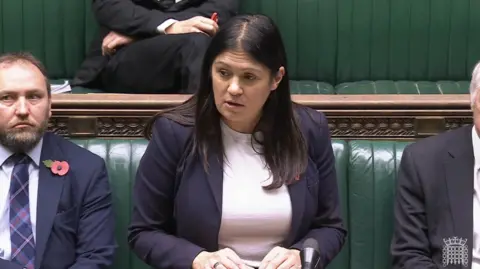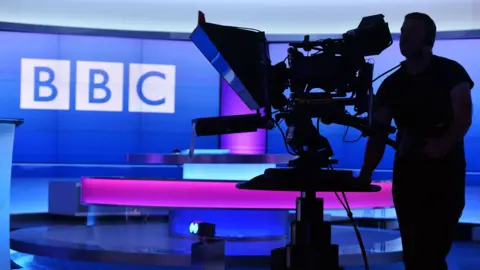
 BBC/Studio Lambert/Paul Chappells
BBC/Studio Lambert/Paul ChappellsThe resignations of BBC bosses Tim Davie and Deborah Turness have reignited the debate about how the organisation is funded.
Some reports suggest the licence fee could be significantly overhauled in 2027, when the current BBC charter expires.
The licence fee raised £3.8bn in the year ending March 2025 – 65% of the BBC’s total income of £5.9bn – but the number of households which pay it is falling.
How could the licence fee change in the future?
The BBC licence fee – currently £174.50 a year – is guaranteed until 31 December 2027, when the current BBC charter expires.
But Culture Secretary Lisa Nandy told Parliament on 11 November that a government review of the charter would begin “imminently”.
She said this would set out the terms of charter – the constitutional basis for the BBC’s operation – “for the next decade”, and would ensure a “genuinely accountable” organisation, which she defended as a “national institution”.
 UK Parliament/PA
UK Parliament/PAIn April 2025, Nandy called the fee “unenforceable”, and told the Telegraph “no options [were] off the table” in terms of its future.
In May 2025, BBC director general Tim Davie agreed that the funding model should be reformed and modernised.
A number of alternatives have been suggested:
- a tax on broadband connections
- a government grant funded out of general taxation
- part-funding through advertising
- a subscription model
In January 2025, Nandy ruled out funding the BBC from general taxation, saying she was thinking “quite radically and creatively” about alternatives.
Why is the licence fee controversial?
The fee, which dates back to 1946, was introduced when the BBC was the UK’s only broadcaster.
But the broadcasting landscape has totally transformed since then, with advertising-funded TV channels, online content such as YouTube and subscription streaming services such as Netflix, Disney+ and Now TV.
You need to have a licence to watch or record programmes as they are being shown on any TV broadcast service in the UK, not just the BBC. It is also required to watch live streams via any online TV services as well as watching or downloading programmes on BBC iPlayer.
However, some people ask why they should be forced to pay for the BBC if they do not use its services.
The latest figures show that there were 23.8 million licences in operation in March 2025, down from 24.1 million in March 2024.
Critics also point out that the the licence fee is a flat-rate payment, which means that the poorest households pay as much as the richest.
In addition, questions have been raised about whether non-payment of the licence fee is a serious enough issue to merit criminal prosecution.
What does the licence fee pay for?
A TV licence costs £174.50 a year or £58.50 for black and white TV sets.
The income from the licence fee funds the BBC’s public service broadcasting operations, including:
- eight national TV channels
- the Welsh-language public service TV channel S4C
- multiple national and local radio stations and two-thirds of the World Service budget
- BBC iPlayer
- the BBC website and the BBC news website
- podcasts
- apps including those covering news, sports, CBeebies and weather
The BBC’s charter says its mission is “to act in the public interest” by providing “impartial, high-quality and distinctive” content, which will “inform, educate and entertain” everyone who pays the licence fee.
The organisation’s remaining income comes from commercial and other activities – such as programme sales, grants, royalties and rental income.
Who needs to pay for a TV licence?
By law, each household in the UK – with some exceptions – has to pay the licence fee if they:
- watch or record programmes as they’re being shown live on any TV channel
- watch programmes live on streaming services
- download or watch programmes on BBC iPlayer
The rules apply to any device on which a programme is viewed, including a TV, desktop or laptop computer, mobile phone, tablet, games console or set-top box.
In most cases, people with second homes need to pay for a separate TV licence.
Tenants are responsible for ensuring they have a TV licence unless their tenancy agreement says their landlord will provide it.
In 2020, the BBC became responsible for paying the licence fee for all over-75s. The cost was previously covered by the government.
Since then, it has only funded free licences for households where someone of that age also receives the means-tested pension credit. The BBC funded more than a million free licences in 2024-25.
Anyone who is registered blind can get a 50% discount.
Customers who struggling to pay can spread the cost across 12 months.

How many people are prosecuted for not paying the licence fee?
If you do not pay the licence fee, you can be taken to court, and fined up to £1,000 (£2,000 in Guernsey) plus legal costs and/or compensation.
The most recent figures show there were 25,550 convictions for licence fee evasion in 2024.
You cannot be sent to prison for licence fee evasion, but you can be jailed for failing to pay the resulting fine.
In March 2025, the TV licensing body estimated that around 88% of households which need a TV licence had one.
It said officers visited more than 1.9 million addresses over the previous 12 months, and found more than 64,000 people watching live TV without a licence.
It said £166m had been spent collecting the licence fee during the period.







